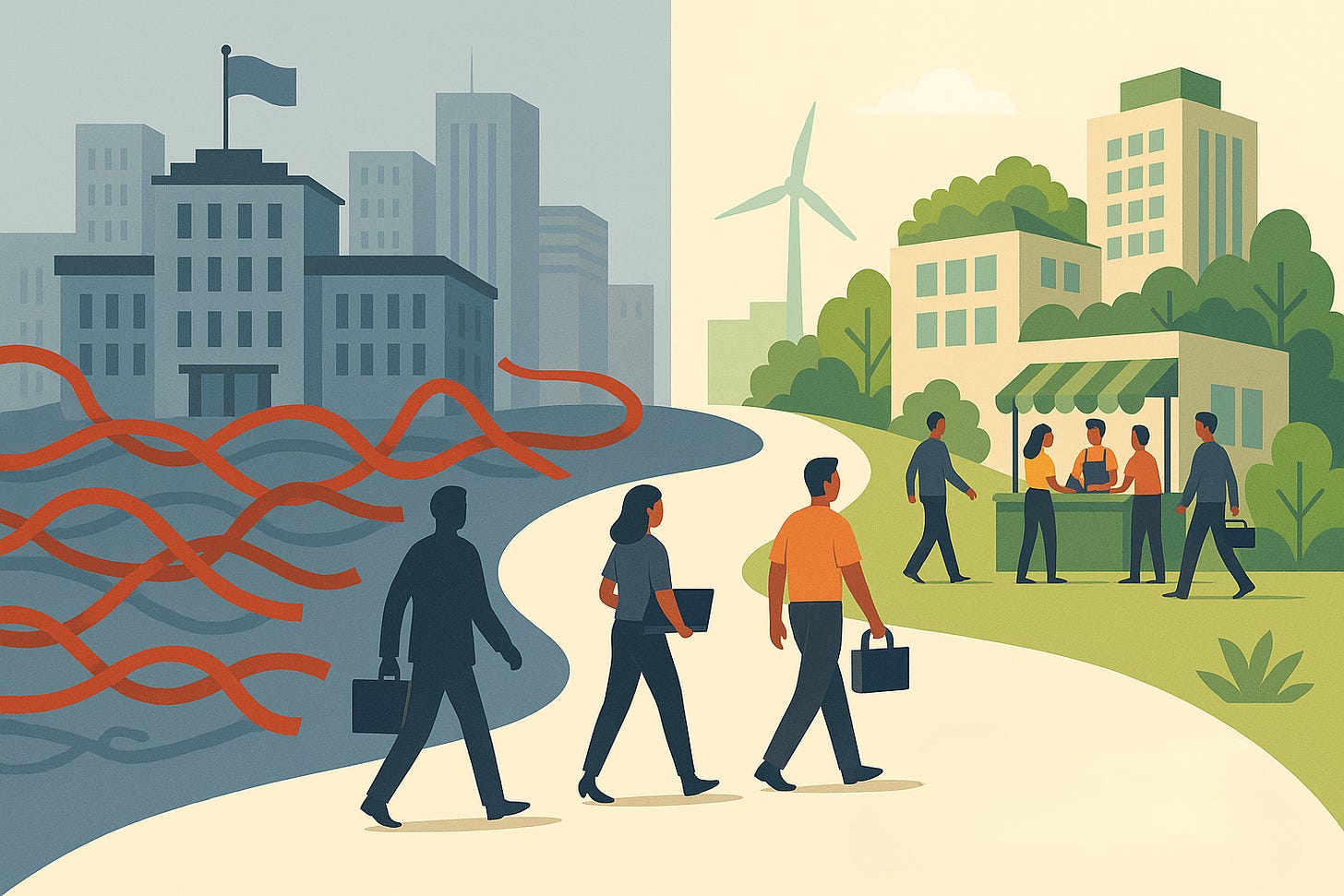There was a time when I felt helpless—paralyzed by the daily news cycle, the erosion of civil discourse, and the deepening social problems I saw around me. Like many others, I noticed a disturbing pattern: as challenges multiplied, so did the calls for more government intervention. And yet, the more the government tried to fix, the worse things seemed to get.
This wasn’t a coincidence. I had come to believe that representative democracy—at least as it operates today—was not the solution, but the source of many of these problems. Still, nearly everyone around me was focused on seizing control of political power, hoping to bend it toward their idea of the “greater good.”
In this environment, the free market was often mischaracterized as the villain. Profit was condemned, business painted as greedy, and power blamed on corporations rather than on the government that granted them their leverage. Few seemed to see the underlying truth: that concentrated political power attracts manipulation. If you give fallible humans the power to reward friends and punish enemies, don’t be surprised when both business and politics become transactional.
Markets, by contrast, arise from something beautiful: individuals seeking to create value, then exchanging that value with others. Human desires are unlimited—and the honest way to meet those desires is through voluntary trade. The dishonest way is through coercion. When people justify coercion as being “for the common good,” they may feel virtuous, but the underlying harm remains. That’s the danger of power.
A clear example from my own memory is Microsoft. In the early days, Microsoft gained dominance simply by offering a product everyone wanted. It didn’t lobby the government. But when competitors couldn’t beat Microsoft in the marketplace, they turned to Washington. The result was an antitrust investigation designed to hobble Microsoft—not to help consumers. Ironically, this strategy worked not because Microsoft was evil, but because the political system incentivized it. That’s when Microsoft began lobbying too.
It wasn’t that any of these individuals were necessarily corrupt. But when institutions reward coercive behavior, even well-intentioned people are drawn into the game. Bad incentives corrupt good actors.
At the time, I couldn’t see how to change such deeply entrenched systems. Political reform seemed impossible—and potentially dangerous. History is full of revolutions that replaced one oppressive regime with another. I knew violence wasn’t the answer, and I had no faith in political means. The pursuit of power always leads to its abuse.
Instead, I became increasingly convinced that we needed to build something new—something voluntary and decentralized. I imagined private communities operating on a contractual basis, managing their own roads, security, and dispute resolution. They wouldn’t try to overthrow the system. They’d simply make it obsolete.
Back in 2004, this felt like a distant dream. But by 2019, those ideas had resurfaced, especially as I revisited the work of Spencer MacCallum and his grandfather Spencer Heath. I began searching for others who believed that governance could be grounded in consent and mutual benefit, rather than coercion.
I discovered a surprising number of people around the world working on this very problem. Many were exploring how private jurisdictions could thrive within the legal framework of special economic zones, startup cities, or charter cities. These weren't just abstract theories—they were becoming real-world experiments.
I learned about Free Private Cities from Titus Gebel, a model in which citizens enter into a service contract with a private provider of governance. I met Francisco Litvay, a Brazilian digital nomad who helped revive Spencer Heath’s book Citadel, Market and Altar. And eventually, I encountered Massimo Mazzone, whose vision for Ciudad Morazán in Honduras aligned closely with the ideas I had once thought impossible to implement.
Suddenly, what once seemed utopian became tangible. I moved to Ciudad Morazán and saw firsthand what it meant to live in a jurisdiction built on consent and entrepreneurship. It wasn’t perfect, but it was a start—and proof that voluntary governance could move from theory to practice.
You don’t need to overthrow a government to change the world. You just need to build something better—and show people they have a choice.
If you’re a digital nomad, entrepreneur, or simply someone who dreams of living more freely, now is the time to pay attention. You might be surprised by what’s already possible.



